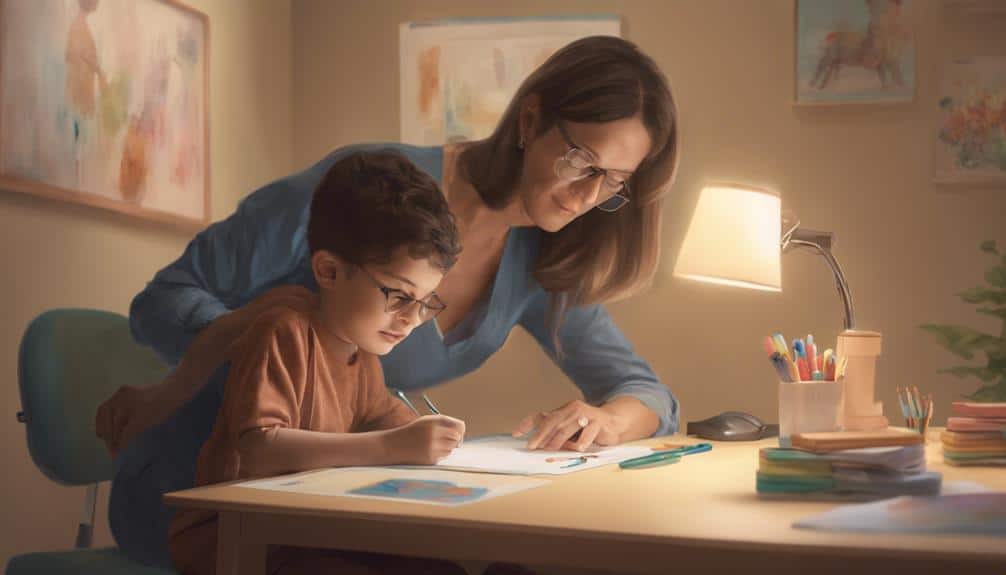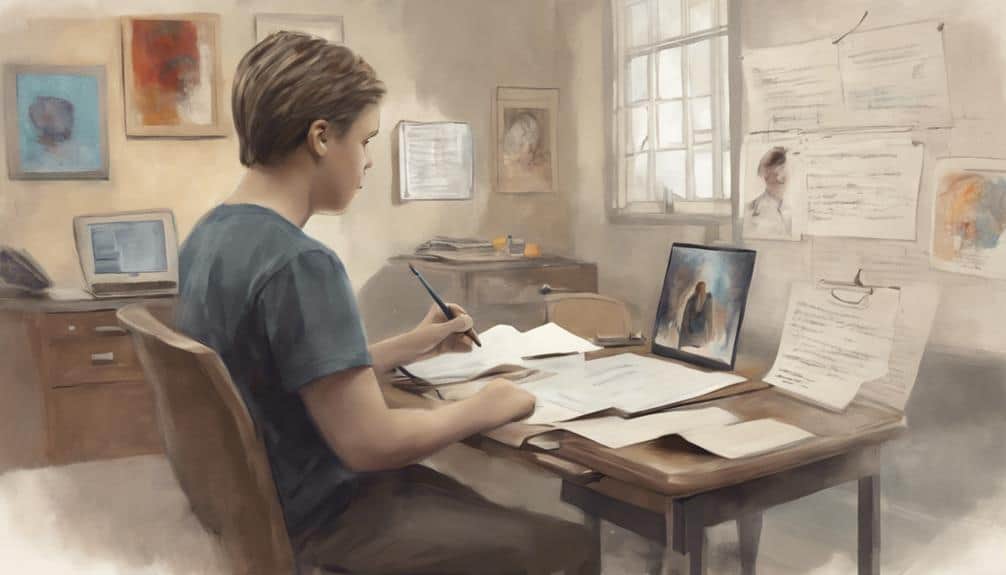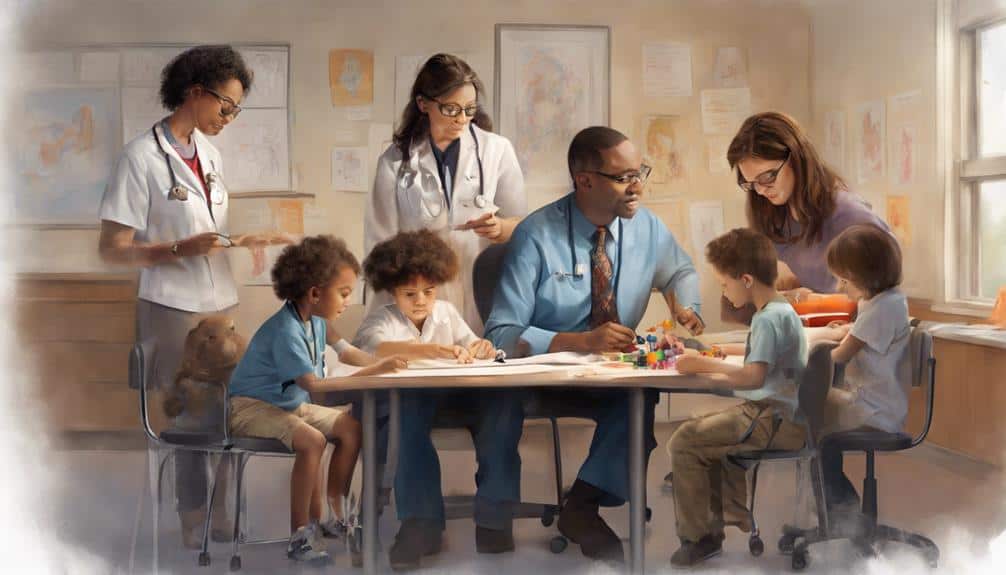Can a Therapist Diagnose Autism
As a therapist, maneuvering the domain of autism diagnosis can be akin to deciphering a complex puzzle with ever-evolving pieces. The question lingers: Can a therapist truly pinpoint autism? While I may observe behaviors and patterns suggestive of autism, the definitive diagnosis lies in the hands of specialized professionals.
However, the journey of unraveling the intricacies of autism diagnosis involves more layers than meet the eye. Let's explore the intricate web of roles and responsibilities that therapists undertake in the complete care of autism assessment, shedding light on the collaborative efforts that pave the way for all-encompassing care.
Key Takeaways
- Therapists recognize autism traits but can't provide official diagnosis.
- They play a crucial role in identifying red flags for timely referrals.
- Collaboration with specialists ensures accurate evaluations.
- Comprehensive assessments by specialized professionals are essential for formal diagnosis.
Therapist's Role in Autism Diagnosis

Therapists play an important role in the diagnosis of autism by recognizing common traits, collaborating with specialists, and evaluating individuals for proper evaluation and care. As a therapist, I observe behaviors and interactions that may indicate autism spectrum disorder. Through evaluations, I can identify red flags that suggest potential autism and work closely with specialists like speech-language pathologists to guarantee a thorough evaluation. One critical aspect of my role is referring individuals for formal autism evaluations by specialized professionals, such as developmental pediatricians or psychologists.
In evaluating children, I pay particular attention to their communication skills, social interactions, and repetitive behaviors. These observations provide valuable insights into the individual's developmental profile and aid in the diagnostic process. By working in conjunction with a multidisciplinary team, including doctors and specialists, I contribute essential information that informs the thorough evaluation and eventual diagnosis of autism.
Qualifications for Autism Diagnosis

Specialized professionals such as child psychiatrists, neurologists, or developmental pediatricians are typically responsible for conducting formal autism diagnoses. When it comes to diagnosing autism spectrum disorder, certain qualifications and procedures need to be met:
- Specialized Professionals: Only qualified specialists like child psychiatrists, neurologists, or developmental pediatricians are authorized to diagnose autism formally.
- Cognitive Assessments: The diagnostic process often involves thorough cognitive assessments to evaluate various aspects of an individual's cognitive functioning.
- Behavioral Observations: Qualified specialists conduct detailed behavioral observations to assess social interactions, communication skills, and repetitive behaviors, all of which are critical for diagnosing autism.
- Recognizing Red Flags: These professionals are trained to recognize subtle signs and red flags that may indicate the presence of autism spectrum disorder and can differentiate them from other developmental conditions.
Therapists, while essential in identifying potential autism traits and facilitating referrals, don't have the authority to provide an official diagnosis. It's important to seek evaluation from qualified specialists to receive a formal autism diagnosis.
Importance of Comprehensive Evaluation

In the process of diagnosing autism spectrum disorder, a thorough evaluation is paramount for accurately evaluating an individual's cognitive, social, and behavioral functioning.
Therapists play a vital role in this process by conducting detailed evaluations that involve observing, interviewing, and evaluating a child for autism. During this assessment, therapists can recognize red flags, such as social communication challenges or repetitive behaviors, which may indicate the presence of autism.
While therapists don't provide a formal diagnosis themselves, they can refer individuals showing potential signs of autism to specialized professionals for further evaluation. This evaluation process typically includes detailed history-taking, cognitive and language assessments, as well as behavioral observations to gather extensive information about the individual's functioning.
Multidisciplinary Team in Diagnosis

How does the involvement of a multidisciplinary team enhance the diagnosis of autism spectrum disorder?
- Specialized Expertise: Psychologists and other specialists bring in-depth knowledge and experience in evaluating autism traits, ensuring a thorough evaluation.
- Therapist Involvement: Therapists play a significant role in recognizing potential red flags associated with autism, facilitating early identification and referral for formal diagnosis.
- Collaborative Approach: Collaboration between therapists, psychologists, and doctors allows for a holistic view of the individual's symptoms, enhancing the accuracy of the diagnosis.
- Comprehensive Care: The multidisciplinary team provides a range of support services, ensuring individuals, especially children, receive the necessary care and interventions post-diagnosis for improved outcomes.
Understanding Autism Spectrum Disorder

Therapists, while instrumental in recognizing key autism traits, don't have the authority to provide an official diagnosis for individuals on the autism spectrum. Official autism diagnoses are typically conducted by specialists such as child psychiatrists, neurologists, or developmental pediatricians. Understanding autism spectrum disorder involves identifying communication challenges, social interaction difficulties, and behavioral patterns unique to each individual. Therapists play an important role in referring individuals for formal evaluation by specialized professionals to guarantee an accurate autism diagnosis.
Collaboration between therapists, doctors, and specialists is essential to guarantee proper care and support for individuals with autism. By working together, they can create tailored intervention plans that address the specific needs of each person on the autism spectrum. This collaborative approach maximizes the effectiveness of treatments and interventions, leading to improved outcomes for individuals with autism spectrum disorder.
Frequently Asked Questions
Can a Therapist Determine if You Have Autism?
Determining if one has autism involves a therapist's role in evaluating symptoms, communication patterns, social cues, sensory sensitivities, and behavioral analysis. Gathering developmental history, understanding family dynamics, and providing follow-up care are essential steps in guiding individuals towards proper diagnosis and support.
Is It Worth Getting an Autism Diagnosis as an Adult?
Getting an autism diagnosis as an adult can be a valuable step towards self-awareness, understanding social challenges, accessing workplace accommodations, improving mental health, nurturing relationships, accepting stigma, embracing identity, joining support groups, and exploring therapy options.
What Does Undiagnosed Autism Look Like?
Undiagnosed autism presents as social challenges, sensory sensitivities, communication difficulties, and repetitive behaviors. Executive functioning issues, masking symptoms, gender differences, and late diagnosis are common. Risks include misdiagnosis. Acceptance of neurodiversity is key.
How Is Autism Professionally Diagnosed?
Recognizing early signs, professionals evaluate diagnostic criteria through a screening process. Examining behavioral aspects, developmental milestones, and family history, specialists identify communication challenges, sensory sensitivities, and risks of misdiagnosis within the autism spectrum.
Conclusion
In summary, while therapists play a vital role in recognizing potential signs of autism, the formal diagnosis is typically conducted by specialized professionals.
However, what if therapists were given the tools and training to make accurate diagnoses themselves? Imagine a future where therapists could directly diagnose autism, streamlining the process and providing timely interventions for individuals on the spectrum.
The possibilities are endless, and the impact on early intervention and support could be revolutionary.







